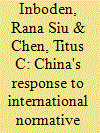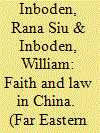| Srl | Item |
| 1 |
ID:
185961


|
|
|
|
|
| Summary/Abstract |
This article examines two key trends: China’s collaboration with other authoritarian nations and its expanding ambitions in the international human rights system. These developments fuel questions about China’s vision for the international human rights system and how China works with other repressive governments to realize its vision. In examining these questions, this article chronicles the emergence of the Like-Minded Group (LMG) in the UN Commission on Human Rights (UNCHR or Commission) in 1999 and investigates China’s relationship with this group. The author documents that under Xi’s leadership China has shifted from a lower-profile role in which the PRC rarely attempted to weaken the international human rights architecture on its own to a now more forceful posture. Since 2017 the PRC has begun to sponsor resolutions in the Human Rights Council (HRC) to propagate its human rights views, with LMG countries as a key source of support.
|
|
|
|
|
|
|
|
|
|
|
|
|
|
|
|
| 2 |
ID:
134698


|
|
|
|
|
| Summary/Abstract |
The negotiations to create the U.N. Human Rights Council provided the Chinese government with opportunities to influence the design of the new body. China was unable to gain the necessary support to restrict the introduction of country-specific resolutions, but it received much support elsewhere without needing to use either coercion or inducement
|
|
|
|
|
|
|
|
|
|
|
|
|
|
|
|
| 3 |
ID:
113974


|
|
|
|
|
| Publication |
2012.
|
| Summary/Abstract |
Over the past three decades, the People's Republic of China's response to international human rights pressure has been guided by its strong state identity, an identity that has prioritised the pursuit of economic productivity, material power and international prestige. The goal of a strong socialist state led Beijing to participate in the UN human rights regime for strategic and diplomatic gains, and later to endorse human rights norms that were perceived as consistent with them. Accordingly, the PRC sees colonialism, imperialism, hegemonism, and racism as key human rights violations, while opposing the universality of human rights and rejecting intrusive human rights monitoring, deemed as detrimental to its strong state goal. After the 1989 Tiananmen Square protests, China faced unprecedented international pressure and responded by challenging aspects of the human rights system. During negotiations to replace the UN Commission on Human Rights with the Human Rights Council, China again sought to shield itself from human rights pressure, primarily by challenging country specific approaches. Thus, instead of the normative influence leading to norm-compliant behaviour, China has sought to diminish human rights pressure and shape international human rights institutions in ways that are advantageous to its state interests.
|
|
|
|
|
|
|
|
|
|
|
|
|
|
|
|
| 4 |
ID:
091363


|
|
|
| 5 |
ID:
089664


|
|
|
|
|
| Publication |
2009.
|
| Summary/Abstract |
The publishing of Zhao Ziyang's memoirs on the 20th anniversary of the 1989 student protests serves as a reminder that before that fateful turning point many observers expected China to embark on a program of political reform. In 1987, the National People's Congress passed legislation that introduced elections at the village level, and given the fact that Zhao's advisers were studying democratic models in other countries, optimists expected the elections to progress to higher levels-and perhaps eventually the national level.
|
|
|
|
|
|
|
|
|
|
|
|
|
|
|
|